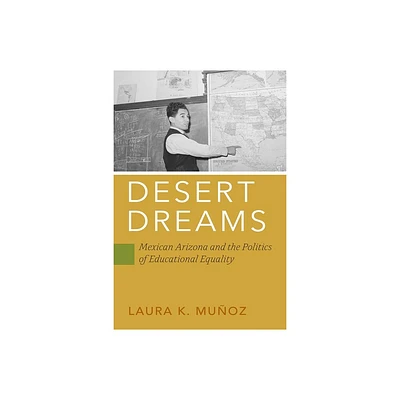Home
Desert Dreams: Mexican Arizona and the Politics of Educational Equality
Loading Inventory...
Barnes and Noble
Desert Dreams: Mexican Arizona and the Politics of Educational Equality
Current price: $45.00


Barnes and Noble
Desert Dreams: Mexican Arizona and the Politics of Educational Equality
Current price: $45.00
Loading Inventory...
Size: Hardcover
*Product Information may vary - to confirm product availability, pricing, and additional information please contact Barnes and Noble
Desert Dreams
chronicles seventy-five years of Mexican American efforts to attain educational equality in Arizona, from its territorial period in the nineteenth century to the post–World War II era. Laura K. Muñoz reveals how Arizona Mexicans, or Arizonenses, embraced the United States expecting that they would be treated as American citizens. Instead, Anglo Arizonans wrote laws and designed schools to transform Mexicans from “unassimilable immigrants” into “American workers” by restricting their education to the acquisition of fluency in English and mastery of basic domestic and industrial skills.
Arizonenses confronted these anti-Mexican attitudes by developing their own politics of educational equality. They founded public schools, served as school leaders, promoted Spanish and English bilingualism, and encouraged their children to pursue high school and college. From these efforts, a small cadre of Arizonenses obtained enough education to sustain a successful middle class, comprised of students, teachers, lawyers, and politicians who fought for Arizonense civil rights, especially the right to a good education. These efforts culminated in
Romo v. Laird
(1925), the earliest known school desegregation case filed in the state. Arizonenses also developed regional networks that brought them into conversation with Mexican Americans and allies in Southern California and across the borderlands.
As the first comprehensive social history of Mexican Americans in Arizona before 1960,
demonstrates that Arizonenses across generations engaged in vital political, legal, and educational debates about civil rights and subsequently gave rise to a national Mexican American political consciousness.
chronicles seventy-five years of Mexican American efforts to attain educational equality in Arizona, from its territorial period in the nineteenth century to the post–World War II era. Laura K. Muñoz reveals how Arizona Mexicans, or Arizonenses, embraced the United States expecting that they would be treated as American citizens. Instead, Anglo Arizonans wrote laws and designed schools to transform Mexicans from “unassimilable immigrants” into “American workers” by restricting their education to the acquisition of fluency in English and mastery of basic domestic and industrial skills.
Arizonenses confronted these anti-Mexican attitudes by developing their own politics of educational equality. They founded public schools, served as school leaders, promoted Spanish and English bilingualism, and encouraged their children to pursue high school and college. From these efforts, a small cadre of Arizonenses obtained enough education to sustain a successful middle class, comprised of students, teachers, lawyers, and politicians who fought for Arizonense civil rights, especially the right to a good education. These efforts culminated in
Romo v. Laird
(1925), the earliest known school desegregation case filed in the state. Arizonenses also developed regional networks that brought them into conversation with Mexican Americans and allies in Southern California and across the borderlands.
As the first comprehensive social history of Mexican Americans in Arizona before 1960,
demonstrates that Arizonenses across generations engaged in vital political, legal, and educational debates about civil rights and subsequently gave rise to a national Mexican American political consciousness.


















